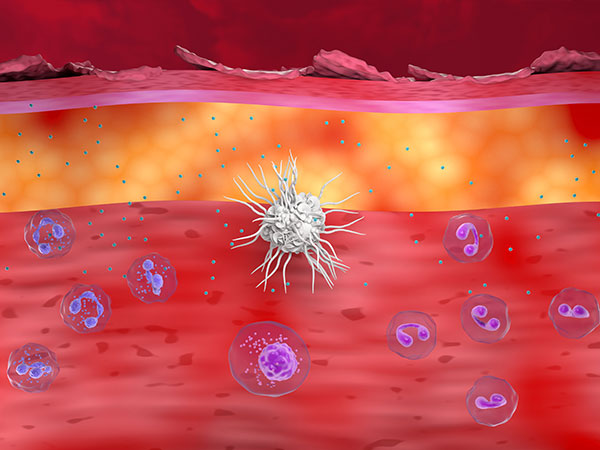Why You May Need an Eczema Care Team

If you have atopic dermatitis—the most common type of eczema—you may be all too familiar with the periodic flare-ups and the itching that often is worse at night and can interfere with sleep.
Along with atopic dermatitis, you may have other co-occurring conditions such as food allergies or asthma. You may also have an increased risk for co-existing conditions such as skin infections, heart disease, cancer, depression or anxiety. These issues can have both an emotional and social impact on your life.
To help you cope with these challenges, having a supportive care team is important. Read on to learn more about which healthcare providers may be part of your care team, how each provider can help you, and why having a care team can benefit you.
Members of your care team
Treating a condition like atopic dermatitis often requires the attention of more than just one healthcare provider. Having a team of supportive professionals, with each one providing a different type of care to meet your needs, can help support you and help you manage your atopic dermatitis.
Here are some of the types of healthcare providers who might be helpful as part of your care team:
- Primary care physician – leads your care team and can refer you to other specialists and resources to manage any health issues.
- Allergist or immunologist – can help you identify triggers or causes of your flare-ups.
- Dermatologist – a specialist in skin disorders who can help manage and treat your atopic dermatitis.
- Mental health provider – can help you cope with feelings of stress, depression, anxiety, or low self-esteem.
- Dietician or nutritionist – can advise you on what to eat to help manage your condition.
Other healthcare providers you may think of having on your care team may include a pediatrician if you are the parent of a child with atopic dermatitis, an acupuncturist, a naturopathic doctor (uses natural health methods for healing), or a functional medicine practitioner (uses your genetics, environment, and lifestyle to create a treatment plan). Pharmacists can counsel you on prescription or over-the-counter (OTC) products or how to take your medicines properly.
“A physician is able to view you in a holistic manner to address the physical and psychological impacts of the disease. They may decide it’s appropriate for you to see an allergist or perhaps a psychologist. Your healthcare provider can provide referrals for these services”.
Mark Levenberg, DO, FAAD, dermatologist and Medical Director at Pfizer Inc.
The benefits of having an atopic dermatitis care team
There are many things you can do alone. However, managing your atopic dermatitis doesn’t have to be one of them. Having a dedicated care team that has your back at every twist and turn along the way can only help you.
Here are a few specific ways in which having a care team can benefit you:
- To make sure you have the correct diagnosis.
Atopic dermatitis can often be disguised as other skin conditions. That’s why it’s important for you to see a healthcare provider who has specialized training in skin conditions, such as a dermatologist, to get the right diagnosis. - To help you learn more about your condition.
Understanding atopic dermatitis and your personal triggers is key in controlling this condition. “Atopic dermatitis is a complex disease that requires a lot of education on the disease itself, as well as an understanding of the impact it has on the patient, their family, and treatment options,” according to Dr. Mark Levenberg. Whether you’re learning more on your own or using your healthcare provider as a resource, becoming better educated about your condition can lead to better outcomes. - To help you build a skin care routine.
Another important part of controlling your condition is proper skin care. This includes properly cleansing your skin, moisturizing your skin, and avoiding harsh detergents or certain chemicals in soaps that can irritate the skin. A healthcare provider, such as a dermatologist, can help advise you on creating a skin care routine that’s right for you. - To walk you through any treatment challenges.
It’s not uncommon for people to have issues taking their medicine as prescribed. The cost of medicine, not understanding treatment instructions, having a complicated treatment regimen, or being concerned about safety can all play a part.
Talk with your healthcare provider about any treatment issues you may be facing. “A partnership with a physician is important because the disease is chronic and may require a long-term approach to management,” says Dr. Levenberg. He or she can help you better manage these issues. - To educate you about new treatment options.
New methods of treating atopic dermatitis may become available, giving you more options. However, Dr. Levenberg cautions, “while there’s a large amount of good, reliable, scientific-based information publicly available to patients, there is also a lot of misinformation or unfounded recommendations that atopic dermatitis sufferers should be aware of. Work with your healthcare provider to learn about the different or new treatment options that might be available,” he continues. “The care for someone with atopic dermatitis often requires an individualized approach based on their unique situation, and he or she can help you find the treatment that may be right for you.” - To manage atopic dermatitis-related issues.
In addition to having atopic dermatitis, you may have other health-related conditions such as food allergies, asthma, or hay fever. Atopic dermatitis can also co-exist with other issues such as other allergic conditions, increased cardiovascular risks, and psychological conditions such as attention-deficit disorder, depression or anxiety.
There are various healthcare providers that can help you manage them. For example, an allergist may help you identify triggers or allergies you may have that are relevant to your eczema, or a mental health provider may help you manage emotional struggles that come with living with a chronic illness.
Talk with your healthcare provider about the different types of care you may need and which doctors could be a part of your care team. If you are in need of a healthcare provider with experience in treating atopic dermatitis, you can use this tool from the National Eczema Association to locate one near you: Eczema Provider Finder.
Dr. Mark Levenberg is a Board-certified Dermatologist and Medical Director in US Medical Affairs at Pfizer Inc.
References
- 1. National Eczema Association. Atopic Dermatitis. Accessed July 3, 2019.
- 2. Familydoctor.org. Eczema and Atopic Dermatitis. Accessed May 9, 2019.
- 3. National Eczema Association. Why People with Eczema Have Trouble Sleeping (and What to Do About It). Accessed April 16, 2019.
- 4. Feldman SR, Cox LS, Strowd LC, et al. The challenge of managing atopic dermatitis in the United States. Am Health Drug Benefits. 2019;12(2):83-93.
- 5. National Eczema Association. Squad Goals: Build Your Own Eczema Care Team. Accessed April 16, 2019.
- 6. ASHP Reports. Patient Education and Counseling. Am J Health-Syst Pharm. 1997;54-431-434.
- 7. Zirwas MJ, Holder JL. Patient education strategies in dermatology: part 1: benefits and challenges. J Clin Aesthet Dermatol. 2009;2(12):24-27.
- 8. American Academy of Allergy Asthma & Immunology. Skin care tips for individuals with atopic dermatitis (eczema). Accessed April 16, 2019.






